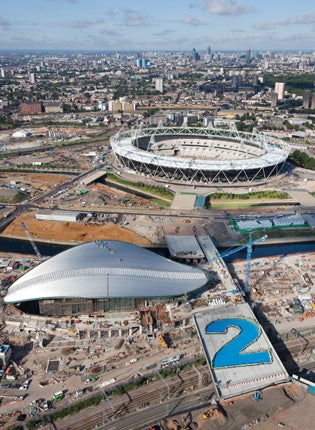Coe confident of balanced budget as 2012 stays ahead of the game
Chairman in bullish mood on eve of today's events to mark two years until Olympics

Five years ago, London began the task of preparing to host from scratch what is in effect 26 world championships squeezed into 16 days. Today marks two years until the opening ceremony of London 2012, and the Games organisers are increasingly confident of delivering "the world's greatest sporting event" with a balanced budget.
This afternoon will see a series of events held at the blossoming Games site in east London to mark the two-year countdown, from Michael Johnson, the four-time Olympic champion, running in the stadium to Sir Chris Hoy testing the velodrome. With a glowing report from the Inter- national Olympic Committee's latest inspection, the continued successful attraction of big-name sponsors and a smooth build progressing across the 500-acre site, London 2012 appears to have left its early budgetary troubles far behind. They are in a healthier position at this stage than any recent Games – leaving aside Beijing, which operated in a different world altogether – although two years is ample time for events to take a turn for the worse, especially in the current economic and political climate.
"The project is at a delicate stage now – it has gone very well, but we're a long way from done and dusted," said Hugh Robertson, the Minister for Sport and the Olympics, yesterday.
"I never quite know whether to be flattered or slightly alarmed that actually the complexity of this is [being] almost overlooked," said Sebastian Coe, chairman of the London Organising Committee of the Olympic Games (Locog). "I do occasionally have to remind people that what we're talking about here is something extraordinary. In construction terms this is two and a half times the size of [Heathrow's] Terminal Five delivered in half the time. The IOC gives us seven years to deliver 26 world championships."
Financially, the Games appears to be on a surprisingly sound footing. It was in 2007 that the current overall budget of £9.3 billion – around £8bn of it going to the Olympic Development Agency, who are constructing the Stratford site – was settled on, some three times larger than had been originally predicted. Only a year ago gloomy forecasts were widespread. The final bill for the build is now predicted to come in at £7.2 billion, although further cuts are likely to be demanded by the government in the autumn. Locog, who will run the Games and raise their money from sponsorship, media rights, merchandise and ticket sales, believe they will produce a "balanced budget".
"We are a business," said Lord Coe. "We are a privately structured organisation that is given the responsibility of organising the Games, and so our ability to do that is predicated entirely on the ability to raise money from the private sector. What is the hallmark of any commercial organisation? It is to raise revenue, to bear down on cost, and to have a really smart procurement team who do the right things at the right time for the right price, and we've got those in place. That is the basis of balancing your budget." Is he confident they will? "Yes. I am."
The need to raise funds for the athletes themselves was the focus yesterday with the launch of a scheme that appeals to small and medium-sized businesses to back the British team.
Team 2012 need to raise a total of £25million – a top-level athlete is given backing of around £70,000 over a four-year Olympic cycle – and are looking to attract 750 local businesses across the country to contribute £10,000 per year for the next two years. Matthew Pinsent, the former Olympian who is the appeal's chairman, admits that "the financial climate is against us."
But Robertson said: "If you are a small or medium business, this is a good way of trying to get some traction for what you are doing by aligning it to a fantastic national event. OK, the climate is testing but then the opportunity on the other side is fantastic and I suppose we are inviting people of make a leap of faith in this. Yes it is challenging, but there is a big opportunity here as well."
Olympics timeline
2010
Today: Two years to go
3-14 October: Commonwealth Games, Delhi
Autumn: Ticket pricing to be announced
2011
January: Velodrome due to be finished – first venue on the Olympic site to be completed to allow British team ample time to train in it
15 March: 500 days to go
April: White Water Canoe Centre in Hertfordshire, scheduled to open
Spring: Tickets go on sale through a public ballot
Summer: Olympic Stadium, Aquatics Centre, Handball Arena and Basketball Arena due to be completed. Test events will follow over the course of the year and the start of 2012
August: World Athletics Championships in South Korea
October: Cultural Olympiad festival programme launched
2012
May: Olympic Torch relay begins
June: Construction begins on temporary venues, such as the beach volleyball in Horse Guards Parade in central London
27 July: Opening ceremony of the London Olympics
12 August: Closing ceremony
23 Aug-9 Sept: Paralympics
Join our commenting forum
Join thought-provoking conversations, follow other Independent readers and see their replies
Comments
Bookmark popover
Removed from bookmarks